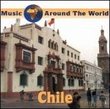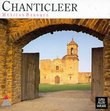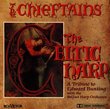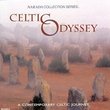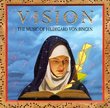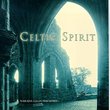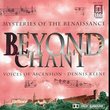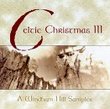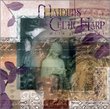| All Artists: Jean-Philippe Rameau, Les Talens Lyriques, Christophe Rousset Title: Rameau - Overtures / Christophe Rousset, Les talens lyriques Members Wishing: 1 Total Copies: 0 Label: Decca Release Date: 7/15/1997 Genre: Classical Styles: Opera & Classical Vocal, Ballets & Dances, Ballets, Historical Periods, Baroque (c.1600-1750) Number of Discs: 1 SwapaCD Credits: 1 UPC: 028945529325 |
Search - Jean-Philippe Rameau, Les Talens Lyriques, Christophe Rousset :: Rameau - Overtures / Christophe Rousset, Les talens lyriques
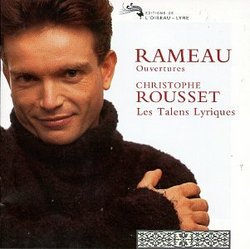 | Jean-Philippe Rameau, Les Talens Lyriques, Christophe Rousset Rameau - Overtures / Christophe Rousset, Les talens lyriques Genre: Classical
No Description Available. Genre: Classical Music Media Format: Compact Disk Rating: Release Date: 15-JUL-1997 |
Larger Image |
CD DetailsSynopsis
Product Description No Description Available. Genre: Classical Music Media Format: Compact Disk Rating: Release Date: 15-JUL-1997 Similar CDs
Similarly Requested CDs
|
CD ReviewsPortrait of Rameau as a rococo composer Gaja Merovinni | Italy | 11/05/2000 (5 out of 5 stars) "Rameau is usually looked upon as the last French baroque composer, a remnant of Louis XIV's age in a time when both audiences and intellectuals were attracted by italian opera. It seems like Christophe Rousset wanted to dispel this cliché; needless to say, he succeds in the task, and this programme, comprising most of the French composer's ouvertures, sheds a new light on Rameau's style. He completely forgets the first authentic Rameau executions (Harnoncourt, for example) which transformed the courtly entertanment of the "tragédie lyrique" in a heavy, dramatic (and, arguably, german) baroque tragedy, to focus on his rather rococo sense of lightness which represents the apotheosis of the aforementioned "french style" while being more international and nearing (dare I say, surpassing?) the first artistic creations of the classical period. Instead of showing us a dull, Lullist (or even Haendelian) Rameau, Rousset paints a rather light portrait of the composer (which really isn't the way he was considered in his time, but that arguably was more of a political than a musical quarrel) making him both more enjoyable and, in my opinion, more authentic, and an isolated innovator, really far from being the last of a french court composer bloodline! In this context, the pieces (even french slow-fugato-coda ones), while keeping a distict french and ramellian flavour (in the treatment of the , seem closer to pre-classical symphonies than usual baroque ouvertures; to enhance this detachment from the late baroque style, harpsichord continuo is not included in this recording (under the excuse, as the liner notes explain, that "there is abundant evidence that the instrumental movements in French opera were normally performed without harpsichord, the use of which was generally restrited to the solo vocal music), which actually is a rather arguable choice, but an understandable one, once you grasp the interpretation's trend. Christophe Rousset, while lacking (in my opinion) a great director's touch, conducts with style, precision and (most important) ingenuity, choosing quick tempi and striving to achieve as much variety as possible, while Les Talens Lyriques' playing is high-spirited, self-assured and full of orchestral colour, which makes them one of the best-suited ensembles for this repertoire. In a word, this is an excellent disc, and one of the best recordings of Rameau's orchestral works, ranking with Marc Minkowski and William Christie's executions." A constant pleasure 12/13/2000 (5 out of 5 stars) "A collection of overtures to operas written by a Baroque composer whose name is well known but whose music is lesser known may not be high on everyone's 'want' list, but I urge you to take a chance on this CD. I obtained this disc as part of a 15-free-CDs introductory offer to a mail order CD club but it has turned out to be a pleasant surprise. This is music that seems to get better the more you hear it and ruminate over it afterward. Rameau is obviously a composer of considerable ingenuity and resource. These ouvertures positively bubble with effervescence and there is a refreshing lack of sameness among them. The period instrument group Les Talens Lyrique (named after one of the ouvertures on this CD) are obviously enthusiastic about this music and their playing is a joy. There is an appealing, analogue-like warmth about the recording, too." Cold heat danielinyaracuy | San Felipe, Yaracuy Venezuela | 09/08/2002 (5 out of 5 stars) "The French Baroque Roccoco School of music has suffered in comparison to the most vibrant Italian competition, or Bach and Handel dexterity and brilliance, not to mention soul enhancing character of their works. That is unfortunate since some of the graduates of that French period like Rameau have a record that is far from insignificant. But Rameau wrote for a public that liked mental games, was more subdued and courtly. The fire had to be contained. But the intelligence and brilliance did not have to be contained. If you want to be convinced of this, do yourself a favor and get this record. I will warn you, you might need to listen to it a few times, to let it grow on you, but next thing you know you might be purchasing some of these great operas. Oh! And the quality of the recording is impeccable, though a little bit low for my taste."
|

 Track Listings (17) - Disc #1
Track Listings (17) - Disc #1
